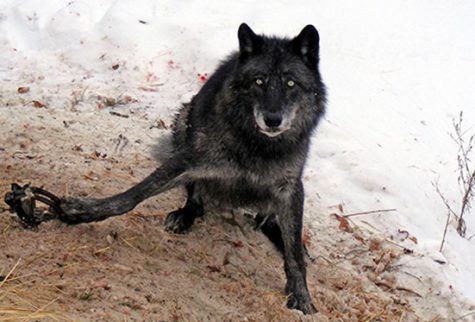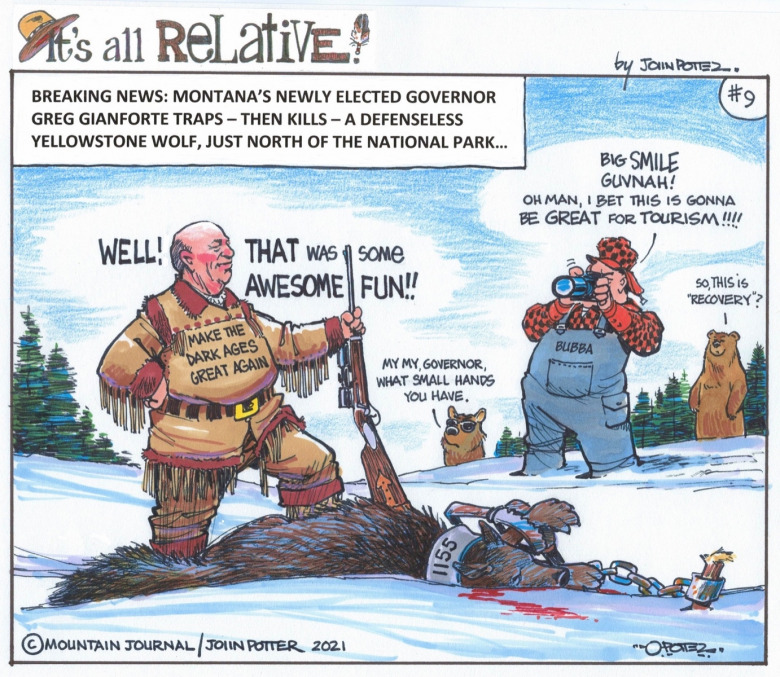Hunting Wolves
Why conservationists and indigenous populations are horrified at the legalization of grey wolf hunting.
Designed by John Potter
(GRAPHIC) A cartoon from Mountain Jounal of Gov. Gianforte and his mangled kill
The Endangered Species Act was passed in 1973 in America to protect plants and animals in danger of becoming extinct in the wild, and one of the first animals to go on that endangered species list was the grey wolf(canis lupus) who had been hunted to near extinction when they resorted to killing cattle to stave off starvation after their prime prey—the elk—was also hunted to near extinction by humans. The grey wolf population—once reaching into the tens of thousands across the U.S.A.—was limited to only a few hundred by the time this happened, but thanks to the Endangered Species Act of 1973, the grey wolf population had reached a population of a little over 6,000 by 2020 within the mainland USA according to National Geographic in their article “Gray wolves Taken Off U.S. Endangered Species List in Controversial Move.”
While a substantial recovery, the U.S. Department of Fish and Wildlife strongly opposed the Trump Administration’s decision to remove protections of the grey wolf in October of 2020 in one of its dying decisions to try and accomplish its broader goal of weakening the Endangered Species Act, claiming the population had “bounced back.” This decision left each state to make its own policies regarding the protection of wolves, and the result horrified conservationists across America.
Since the decision, the prime culprits of Wisconsin, Idaho, and Montana have made laws allowing and encouraging the mass slaughter of wolves—sometimes up to 90% of the state’s population—allowing the use of hunting methods such as wire snares, choke snares, and using hunting dogs and motor vehicles to chase down wolves until they tire and collapse from exhaustion, according to relistwolves.org(an organization fighting to get wolves re-listed onto the endangered species list). In Idaho, wolf puppies have been stomped to death with the tacit approval of Idaho’s Fish and Game foundation.

In Wisconsin, 216 wolves(more than 25% of the state’s estimated population) were confirmed dead within the first 60 hours of the hunting season; this was almost double the initial quota of 119. In addition, the WI Department of Natural Resources has authorized an additional kill quota of 300 wolves for the hunting season that started on November 6th.
Wisconsin’s indigenous populations have hit back hard to try and minimize the damage by stating that the decision actively violates their federal treaty rights, but to no avail. President of the Lac du Flambeau Band of the Lake Superior Chippewa, John Johnson Sr., was recorded stating that, “[Wisconsin government officials] don’t care. They don’t have any respect for our tribes.”
On July 1st, Idaho’s legislation has sanctioned and encouraged the slaughter of 90% of the state’s wolf population through bounties given out for each successful wolf kill against the ID Dept. of Fish and Game’s wishes.
Montana has sanctioned the killing of up to 85% of its wolf population and extended their trapping and hunting further into wolf breeding season—something Missouri hasn’t even done with deer, even though deer overpopulation actively harms human life and the environment according to the MO Conservation Center. Governor Gianforte of Montana was even confirmed to have personally slaughtered a Yellowstone wolf in violation of state law, according to the Washington Post.
Wolves are a vital part of the American ecosystem, and, at the Colorado Wolf and Wildlife Center in Divide, animal caretaker supervisor Erika Moore was recorded saying that, without wolves, the USA “[…] cannot support how many elk and deer we have” and “[the USA is] going to start to see a degradation of ecosystems due to that.”
The Yellowstone National Park is a rather famous example used often to support the reintroduction of wolves into the ecosystem where the reintroduced wolves helped to cull the overpopulated deer and elk population—a decision that resulted in restored grass populations, less soil erosion, cleaner streams and rivers, increased fish populations, and more in an awe-inspiring domino effect that brought ecological balance back to the park.
Wolves are important, and the ecological health of America will suffer from the severe culling of their populations due to an unjust and unsupported legal decision by the federal government during the Trump Administration’s reign. Without societal backlash, this decision will not change, and we need to stop this for the sake of not only the wolves but also the environments they affect.

Favorite Quote: "The earth is the cradle of humanity, but mankind cannot stay in the cradle forever." -Konstantin Tsiolkovsky
Favorite Food: Chicken Alfredo lasagna roll-ups
Fun Fact: I have 9 pets.







